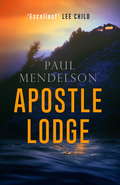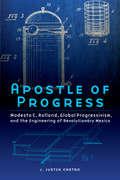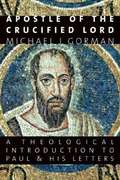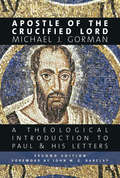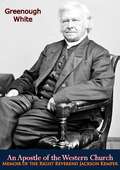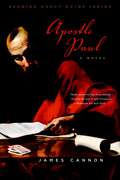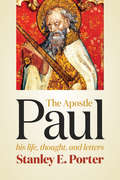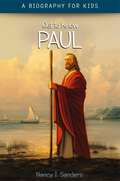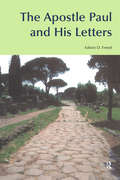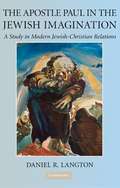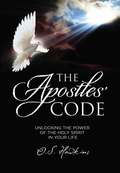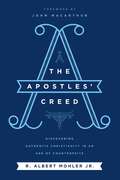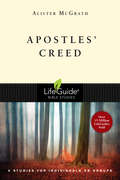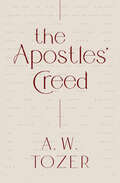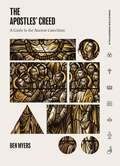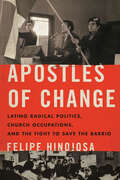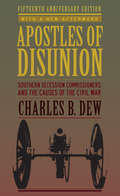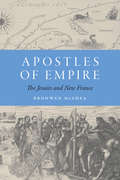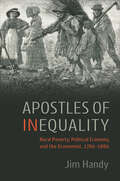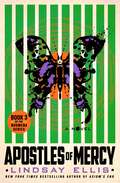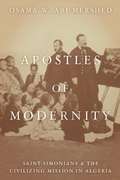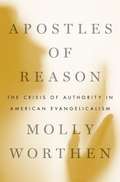- Table View
- List View
Apostle Lodge
by Paul MendelsonFrom the author of the acclaimed The First Rule of Survival, praised by Lee Child as 'excellent and uncompromising', comes Paul Mendelson's explosive latest thriller.Apostle Lodge looks out over the ocean, an award-winning mansion built by a renowned architect. Stark and minimal, its black opaque windows hide a terrible secret. As Colonel Vaughn De Vries investigates the depraved crime committed within its walls, he believes there may be more than one killer on the loose, all with connections to a charismatic man who as a child, drowned his sister and shattered his family.And his work is not over yet.'A jaw-droppingly brilliant crime thriller. Imagine The Killing moved to Cape Town and into the landscape of the hot and dusty African veld' Philip Glenister'Mendelson plots so smoothly and writes so powerfully' The Guardian
Apostle Lodge (Col Vaughn de Vries #4)
by Paul MendelsonFrom the author of the acclaimed The First Rule of Survival, praised by Lee Child as 'excellent and uncompromising', comes Paul Mendelson's explosive latest thriller.Apostle Lodge looks out over the ocean, an award-winning mansion built by a renowned architect. Stark and minimal, its black opaque windows hide a terrible secret. As Colonel Vaughn de Vries investigates the depraved crime committed within its walls, he believes there may be more than one killer on the loose, all with connections to a charismatic man who, as a child, drowned his sister and shattered his family.And his work is not over yet.'A jaw-droppingly brilliant crime thriller. Imagine The Killing moved to Cape Town and into the landscape of the hot and dusty African veld' Philip Glenister'Mendelson plots so smoothly and writes so powerfully' The Guardian
Apostle of Progress: Modesto C. Rolland, Global Progressivism, and the Engineering of Revolutionary Mexico (The Mexican Experience)
by J. Justin CastroFrom the late nineteenth century to the middle of the twentieth century, Mexico experienced major transformations influenced by a global progressive movement that thrived during the Mexican Revolution and influenced Mexico’s development during subsequent governments. Engineers and other revolutionary technocrats were the system builders who drew up the blueprints, printed newspapers, implemented reforms, and constructed complexity—people who built modern Mexico with an eye on remedying long-standing problems through social, material, and infrastructural development during a period of revolutionary change. In Apostle of Progress J. Justin Castro examines the life of Modesto C. Rolland, a revolutionary propagandist and a prominent figure in the development of Mexico, to gain a better understanding of the role engineers played in creating revolution-era policies and the reconstruction of the Mexican nation. Rolland influenced Mexican land reform, petroleum development, stadium construction, port advancements, radio broadcasting, and experiments in political economy. In the telling of Rolland’s story, Castro offers a captivating account of the Mexican Revolution and the influence of global progressivism on the development of twentieth-century Mexico.
Apostle of the Crucified Lord: A Theological Introduction to Paul and His Letters
by Michael J. GormanUnlike the many books that treat the apostle Paul merely as a historical figure and his letters as literary relics, this new study by Michael Gorman focuses on the theological message of Paul's writings, particularly what they have to say to the contemporary church. An innovative and comprehensive treatment of Paul, including commentary on all of the Pauline letters, Gorman's Apostle of the Crucified Lord unpacks the many dimensions of Paul's thought carefully and holistically. Six introductory chapters provide background discussion on Paul's world, his resume, his letters, his gospel, his spirituality, and his theology, while the main body of the book covers in turn and in full detail each of the Pauline epistles. Gorman gives the context of each letter, offers a careful reading of the text, and colors his words with insightful quotations from earlier interpreters of Paul. Enhancing the text itself are questions for reflection and discussion at the end of each chapter and numerous photos, maps, and tables throughout. All in all, Apostle of the Crucified Lord is the ideal book for students and any other readers interested in seriously engaging Paul's challenging letters. "
Apostle of the Crucified Lord: A Theological Introduction to Paul and His Letters
by Michael J. GormanTHIS COMPREHENSIVE, WIDELY USED TEXT by Michael Gorman presents a theologically focused, historically grounded interpretation of the apostle Paul and raises significant questions for engaging Paul today. After providing substantial background information on Paul's world, career, letters, gospel, spirituality, and theology, Gorman covers in full detail each of the thirteen Pauline epistles. Enhancing the text are questions for reflection and discussion at the end of each chapter as well as numerous photos, maps, and tables throughout. The new introduction in this second edition helpfully situates the book within current approaches to Paul. Gorman also brings the conversation up-to-date with major recent developments in Pauline studies and devotes greater attention to themes of participation, transformation, resurrection, justice, and peace.
Apostle of the Crucified Lord: A Theological Introduction to Paul and His Letters
by Michael J. GormanTHIS COMPREHENSIVE, WIDELY USED TEXT by Michael Gorman presents a theologically focused, historically grounded interpretation of the apostle Paul and raises significant questions for engaging Paul today. After providing substantial background information on Paul's world, career, letters, gospel, spirituality, and theology, Gorman covers in full detail each of the thirteen Pauline epistles. Enhancing the text are questions for reflection and discussion at the end of each chapter as well as numerous photos, maps, and tables throughout. The new introduction in this second edition helpfully situates the book within current approaches to Paul. Gorman also brings the conversation up-to-date with major recent developments in Pauline studies and devotes greater attention to themes of participation, transformation, resurrection, justice, and peace.
An Apostle of the Western Church: Memoir of the Right Reverend Jackson Kemper
by Greenough WhiteBishop (David) Jackson Kemper (1789-1870) was the first missionary bishop of the Episcopal Church in the United States of America. He was made a deacon of the Episcopal Church in 1811 and was ordained as a priest in 1814. In 1835, the Episcopal Church undertook to consecrate missionary bishops to preach the Gospel west of the settled areas, and Kemper was the first to be chosen. He promptly headed west. Having found that clergy who had lived all their lives in the settled East were slow to respond to his call to join him on the frontier, he determined to recruit priests from among men who were already in the West, and established a college in St. Louis, Missouri, for that purpose. He went on to found Nashotah House and Racine College in Wisconsin, and founded the mission parish that became the Cathedral Church of All Saints in Milwaukee. He constantly urged a more extensive outreach to the Native American peoples, and translations of the Scriptures and the services of the Church into their languages. From 1859 till his death in 1870, he was bishop of Wisconsin.-Print ed.
Apostle Paul: A Novel
by James CannonThe iconic Saint Paul - in his lifetime a scholar, prosecutor for the high court of the Jews, accomplice in murder, adventurer, traveler, orator, writer, advocate, and organizer of a new faith - was in fact a Jewish-Hellenistic citizen of the Roman Empire, a man who by the force of his intellect and indomitable will changed the course of history. Eventually he became the leader of the movement that delivered the social and moral authority of Christianity to a pagan world. Given a message - that man and woman had a purpose in earthly life and a future beyond the grave - he carried it first and unsuccessfully to his fellow Jews, then successfully to the gentiles and all mankind. His quality of mind and ability to exhort and persuade, his personal commitment to ethical conduct and values, and his courage and indefatigability made Paul one of the continuing forces in the progress of Western civilization.Author James Cannon has written about political leaders as a journalist, has served with leaders in public life, and has written feature stories while on the staffs of Time and Newsweek. Now he has taken the story of one of the most momentous quests in history and brought it to life with a vitality and immediacy that is at once gripping, informative, and inspiring.
The Apostle Paul: His Life, Thought, and Letters
by Stanley E. PorterIn this comprehensive introduction to the apostle Paul, Stanley Porter devotes serious consideration both to the background and major contours of Paul’s thought and to the unique contributions of each of his letters. Porter begins by introducing the Pauline tradition and outlining the basics of Paul’s life, the chronology of his ministry, and his several imprisonments. Porter then discusses the background to Paul’s thought, examines some of the major themes of his writings, and treats issues concerning the Pauline epistles, such as pseudonymity and canon. Finally, Porter delves into all thirteen of Paul’s letters individually, placing them within their historical contexts and examining critical issues relating to the content and interpretation of each letter. The result is a thorough, balanced treatment of one of the most important figures in Christianity.
Apostle Paul (Get to Know)
by Nancy I. SandersApostle Paul—part of the Get to Know series—is a unique biography about Paul. Focusing on the life and character of this Biblical hero, using color photographs, maps, and other visual resources to tell the whole story, young biography fans will come to learn more about this man of the God, his writings, his impact on the early church, and the role he plays in history.Featuring a bibliography and scriptural references throughout, this is sure to become a favorite for young readers and for first book reports.
The Apostle Paul and His Letters (Bibleworld Ser.)
by Edwin D. Freed'The Apostle Paul and His Letters' presents a detailed examination of the apostle's seminal writings in the Book of Acts. Paul was writing primarily to converts who had joined church communities only recently, mostly forsaking either Judaism or paganism. Paul's emphases on faithfulness toward God, the faithfulness of Jesus, and his moral teachings are always primary themes. The book discusses a range of topics: the circumstances that led Paul to write each letter; Paul's emphasis on the morality of the believers to whom he was writing; the influence of Old Testament, Qumran, and pagan writings on Paul's own; the intellectual and cultural context of the time; and how careful attention to Paul's language can shed light on his meaning. This book is written for a wide range of interested readers, including students, pastors, church workers and others interested in learning about Paul as a person and his work.
The Apostle Paul in the Jewish Imagination: A Study in Modern Jewish-Christian Relations
by Daniel R. LangtonThe Apostle Paul in the Jewish Imagination is a pioneering multidisciplinary examination of Jewish perspectives on Paul of Tarsus. Here, the views of individual Jewish theologians, religious leaders, and biblical scholars of the last 150 years, together with artistic, literary, philosophical, and psychoanalytical approaches, are set alongside popular cultural attitudes. Few Jews, historically speaking, have engaged with the first-century Apostle to the Gentiles. The modern period has witnessed a burgeoning interest in this topic, however, with treatments reflecting profound concerns about the nature of Jewish authenticity and the developing intercourse between Jews and Christians. In exploring these issues, Jewish commentators have presented Paul in a number of apparently contradictory ways. The Apostle Paul in the Jewish Imagination represents an important contribution to Jewish cultural studies and to the study of Jewish-Christian relations.
The Apostles' Code: Unlocking the Power of God’s Spirit in Your Life
by O. S. HawkinsDiscover the power of the Holy Spirit in your life as you journey with bestselling author O. S. Hawkins from Easter to Pentecost.Do you have moments when you feel defeated, scared, or hopeless? The apostles must have felt that way when Jesus was crucified, because they abandoned Jesus and fled. Yet just a few weeks later they couldn't help but boldly speak of the things they had seen and heard. What empowered them to be willing to lay down their lives for Jesus? It was the Holy Spirit who came to live in each of them at Pentecost. And He is the same Holy Spirit who lives in each of us who have trusted Him for our salvation.In The Apostles' Code, bestselling author O. S. Hawkins leads readers on a 40-day journey to discover the power of the Holy Spirit in their lives. Each reflection on the Holy Spirit is accompanied by a Code word for the day, an encouraging Scripture, and a prayer.Feel the power of the Holy Spirit in your life today, and be filled with the promise that He will never leave you or forsake you.
The Apostles' Creed: Discovering Authentic Christianity in an Age of Counterfeits
by Jr. R. Albert MohlerThe president of Southern Baptist Theological Seminary reveals how understanding and living out of the oldest summary of Christian belief leads to a confident, bold, joy-filled existence in a world of confusion and uncertainty.The Apostles' Creed has shaped and guided Christian faith for almost two thousand years. Few documents in the history of the church have similar influence on the life of ordinary believers. Shared by Protestant, Roman Catholic, and Eastern Orthodox traditions, the Apostles' Creed is perhaps the most compelling and formidable statement of Christian doctrine the world has ever known. But do we know what it really means--and how it applies to us today?In The Apostles' Creed, renowned theologian and pastor R. Albert Mohler Jr. works line-by-line and phrase-by-phrase through each section of the Creed, explaining in clear terms what it means and how it equips Christians to live faithfully in a post-Christian culture. From understanding the nature of the Trinity and the miracle of the Incarnation to the world-shaking truth of the resurrection and the hope of Christ's return, the theological heritage contained in this ancient statement has the power to shape us for vibrant and steadfast living today. The Apostles' Creed shows us how.
Apostles' Creed (LifeGuide Bible Studies)
by Alister McGrath"I believe in God the Father, Almighty, Maker of heaven and earth." This six-session LifeGuide Bible Study, based on Alister McGrath's book I Believe, introduces us to the Apostles' Creed and the essential truths about God the Father, the person and work of Jesus Christ, and the Holy Spirit. Christians indeed trust in God, and the basics of our faith have remained the same for centuries. These truths are summarized in historic church documents known as creeds. The Apostles' Creed is an ideal starting point for this vital process of consolidating our grasp of the faith. For over three decades LifeGuide Bible Studies have a provided solid biblical content and raised thought-provoking questions—making for a one-of-a-kind Bible study experience for individuals and groups. This series has more than 130 titles on Old and New Testament books, character studies, and topical studies.
The Apostles' Creed
by A. W. TozerWe believe . . . an ancient creed is essential for today. A. W. Tozer derived great personal satisfaction and help from the church creeds, and he used them as he preached and taught. This new book draws on four previously published essays and several articles that have never before been published in books. Tozer brings the reader through the essential facets of the Christian faith through the Apostles' Creed:God the Father, Jesus Christ, and the Holy SpiritWhat it means that Jesus was Crucified, Resurrected, Ascended, and ReturningHow are we to understand The Communion of the Church, Forgiveness, and EternityBeginning with Why the Creeds are Still Important Today and ending with Connecting Our Creeds to Our Deeds, this book brings the reader into a rich experience of the Christian life. If you wish to study the classic truths of biblical doctrine and connect them to a vibrant spiritual life, join Tozer in a journey through The Apostles' Creed.
The Apostles’ Creed: A Guide to the Ancient Catechism
by Benjamin MyersDo You Believe? Today we’re flooded with opinions and ideas. And they all might be interesting, but are they true? Would you die for them? Ben Myers re-introduces the Apostles’ Creed. He helps us to see how difficult and counter-cultural the Creed really is. It doesn’t give us sweet, empty words. It’s a faith that demands we die so that we might live. In the early church many converts died for their faith. So they needed to have a good idea what they might die for! Early church pastors and theologians used the Apostles’ Creed as the essential guide to the basics of the Christian life. The Apostles’ Creed has united Christians from different times, different places, and different traditions. The truths proclaimed in the Creed are eternal. Will you trust them?
Apostles of Change: Latino Radical Politics, Church Occupations, and the Fight to Save the Barrio
by Felipe HinojosaThis “important and well-researched” study of 1960s urban Latino activism and religion is “brimming with the ideas and voices of . . . Latinx activists” (Llana Barber, author of Latino City).In the late 1960s, American cities found themselves in steep decline, with poor and working-class families hit the hardest. Many urban religious institutions debated whether to move to the suburbs. Against the backdrop of the Black and Brown Power movements, which challenged economic inequality and white supremacy, young Latino radicals began occupying churches and disrupting services to compel church communities to join their protests against urban renewal, poverty, police brutality, and racism.Apostles of Change tells the story of these occupations and establishes their context within the urban crisis. It underscores the tensions they created and the activists’ bold, new vision for the church and the world. Through case studies from Chicago, Los Angeles, New York City, and Houston, Felipe Hinojosa reveals how Latino freedom movements crossed the boundaries of faith and politics. He argues that understanding these radical politics is essential to understanding the dynamic changes in Latino religious groups from the late 1960s to the early 1980s.
Apostles of Change: Latino Radical Politics, Church Occupations, and the Fight to Save the Barrio
by Felipe HinojosaThis “important and well-researched” study of 1960s urban Latino activism and religion is “brimming with the ideas and voices of . . . Latinx activists” (Llana Barber, author of Latino City).In the late 1960s, American cities found themselves in steep decline, with poor and working-class families hit the hardest. Many urban religious institutions debated whether to move to the suburbs. Against the backdrop of the Black and Brown Power movements, which challenged economic inequality and white supremacy, young Latino radicals began occupying churches and disrupting services to compel church communities to join their protests against urban renewal, poverty, police brutality, and racism.Apostles of Change tells the story of these occupations and establishes their context within the urban crisis. It underscores the tensions they created and the activists’ bold, new vision for the church and the world. Through case studies from Chicago, Los Angeles, New York City, and Houston, Felipe Hinojosa reveals how Latino freedom movements crossed the boundaries of faith and politics. He argues that understanding these radical politics is essential to understanding the dynamic changes in Latino religious groups from the late 1960s to the early 1980s.
Apostles of Disunion: Southern Secession Commissioners and the Causes of the Civil War (A Nation Divided: Studies in the Civil War Era)
by Charles B. DewIn late 1860 and early 1861, state-appointed commissioners traveled the length and breadth of the slave South carrying a fervent message in pursuit of a clear goal: to persuade the political leadership and the citizenry of the uncommitted slave states to join in the effort to destroy the Union and forge a new Southern nation.Directly refuting the neo-Confederate contention that slavery was neither the reason for secession nor the catalyst for the resulting onset of hostilities in 1861, Charles B. Dew finds in the commissioners' brutally candid rhetoric a stark white supremacist ideology that proves the contrary. The commissioners included in their speeches a constitutional justification for secession, to be sure, and they pointed to a number of political "outrages" committed by the North in the decades prior to Lincoln's election. But the core of their argument--the reason the right of secession had to be invoked and invoked immediately--did not turn on matters of constitutional interpretation or political principle. Over and over again, the commissioners returned to the same point: that Lincoln's election signaled an unequivocal commitment on the part of the North to destroy slavery and that emancipation would plunge the South into a racial nightmare.Dew's discovery and study of the highly illuminating public letters and speeches of these apostles of disunion--often relatively obscure men sent out to convert the unconverted to the secessionist cause--have led him to suggest that the arguments the commissioners presented provide us with the best evidence we have of the motives behind the secession of the lower South in 1860-61.Addressing topics still hotly debated among historians and the public at large more than a century after the Civil War, Dew challenges many current perceptions of the causes of the conflict. He offers a compelling and clearly substantiated argument that slavery and race were absolutely critical factors in the outbreak of war--indeed, that they were at the heart of our great national crisis.
Apostles of Empire: The Jesuits and New France (France Overseas: Studies in Empire and Decolonization)
by Bronwen McSheaApostles of Empire is a revisionist history of the French Jesuit mission to indigenous North Americans in the seventeenth and eighteenth centuries, offering a comprehensive view of a transatlantic enterprise in which secular concerns were integral. Between 1611 and 1764, 320 Jesuits were sent from France to North America to serve as missionaries. Most labored in colonial New France, a vast territory comprising eastern Canada and the Great Lakes region that was inhabited by diverse Native American populations. Although committed to spreading Catholic doctrines and rituals and adapting them to diverse indigenous cultures, these missionaries also devoted significant energy to more-worldly concerns, particularly the transatlantic expansion of the absolutist-era Bourbon state and the importation of the culture of elite, urban French society. In Apostles of Empire Bronwen McShea accounts for these secular dimensions of the mission’s history through candid portraits of Jesuits engaged in a range of secular activities. We see them not only preaching and catechizing in terms that borrowed from indigenous idioms but also cultivating trade and military partnerships between the French and various Indian tribes. Apostles of Empire contributes to ongoing research on the Jesuits, New France, and Atlantic World encounters, as well as on early modern French society, print culture, Catholicism, and imperialism. McShea shows how the Jesuits’ robust conceptions of secular spheres of Christian action informed their efforts from both sides of the Atlantic to build up a French and Catholic empire in North America through significant indigenous cooperation.
Apostles of Inequality: Rural Poverty, Political Economy, and the Economist, 1760–1860
by Jim HandyBetween 1760 and 1860, the English countryside was subject to constant attempts at agricultural improvement. Most often these meant depriving cottagers and rural workers of access to land they could cultivate, despite evidence that they were the most productive farmers in a country constantly short of food. Drawing from a wide range of contemporary sources, Apostles of Inequality argues that such attempts, driven by a flawed faith in the wonders of capital, did little to increase agricultural productivity and instead led to a century of increasing impoverishment in rural England. Jim Handy rejects the assertions about the benefits that accompanied the transition to "improved" agriculture and details the abundant evidence for the efficiency of smallholder, peasant agriculture. He traces the development of both economic theory and government policy through the work of agricultural improver Arthur Young (1741–1820), government advisor Nassau William Senior (1790–1864), and the editors and writers of the Economist, as well as Adam Smith and Thomas Robert Malthus. Apostles of Inequality demonstrates how a fascination with capital – promoted by political economy and farmers’ desires to have a labour force completely dependent on wage labour – fostered widespread destitution in rural England for over a century.
Apostles of Mercy: A Novel (Noumena #3)
by Lindsay EllisTHE INSTANT NATIONAL BESTSELLERApostles of Mercy is the new alternate history first contact novel from the instant New York Times, Wall Street Journal and LA Times bestselling Lindsay Ellis.First Contact has not been going well. The nations of Earth are rapidly militarizing against the arrival of the Superorganism, an alien civilization that promises to destroy humanity before it can develop into a real threat. The Superorganism has done it before–to their distant transient relatives–and they could easily do it again. But the alien Ampersand and his human interpreter Cora Sabino are done with trying to save humanity from both the Superorganism and itself; to them, this is a civilization that does not deserve to be saved.When a strange new form of communication between the two of them reveals to Cora how alien Ampersand truly is, she begins to question her blind devotion. But she soon learns of a danger that may force them to leave Earth before either of them are ready: a group of superorganism enemies that have been wreaking havoc on Earth for decades. Existence on the margins has made them desperate and bent on revenge against any of Ampersand's race whose path they cross. Before Cora and Ampersand can make their final escape, these hostile aliens stage an attack, and take that which is most dear to both of them.Ampersand's enemies will not consider any form of truce; the greatest threat to them is not from the Superorganism, but from an increasingly fearful and violent human civilization newly aware of their existence. Cora and Ampersand must go to extreme measures to take back what was stolen and prevent wholesale human extermination–but in doing so they may be no better than the civilizations they are trying to escape.
Apostles of Modernity: Saint-Simonians and the Civilizing Mission in Algeria
by Osama Abi-MershedInfluenced by the teachings of philosopher Henri de Saint-Simon (1760-1825), says Ali-Mershed (history, Georgetown U.), France's military Arabists making colonial policy for Algeria from 1830 to 1870 opposed native assimilation, and promoted what they called controlled association with the Muslims. Following him, they contested the existence of primordial human racial and cultural racial and cultural characteristics, he explains, and insisted that societies at different stages of historical development should evolve within their particular institutional structures and cultural traditions. He describes how their discretionary control over the Arab territories provided them a human laboratory for their experiments with Saint-Simonian reforms, and the geographic space to erect a semi-autonomous and protected Arab Kingdom. Annotation ©2010 Book News, Inc., Portland, OR (booknews.com)
Apostles of Reason: The Crisis of Authority in American Evangelicalism
by Molly WorthenEvangelical Christianity is a paradox. Evangelicals are radically individualist, but devoted to community and family. They believe in the transformative power of a personal relationship with God, but are wary of religious enthusiasm. They are deeply skeptical of secular reason, but eager to find scientific proof that the Bible is true. <P> In this groundbreaking history of modern American evangelicalism, Molly Worthen argues that these contradictions are the products of a crisis of authority that lies at the heart of the faith. Evangelicals have never had a single authority to guide them through these dilemmas or settle the troublesome question of what the Bible actually means. Worthen chronicles the ideological warfare, institutional conflict, and clashes between modern gurus and maverick disciples that lurk behind the more familiar narrative of the rise of the Christian Right. The result is an ambitious intellectual history that weaves together stories from all corners of the evangelical world to explain the ideas and personalities-the scholarly ambitions and anti-intellectual impulses-that have made evangelicalism a cultural and political force.<P> In Apostles of Reason, Worthen recasts American evangelicalism as a movement defined not by shared doctrines or politics, but by the problem of reconciling head knowledge and heart religion in an increasingly secular America. She shows that understanding the rise of the Christian Right in purely political terms, as most scholars have done, misses the heart of the story. The culture wars of the late twentieth century emerged not only from the struggle between religious conservatives and secular liberals, but also from the civil war within evangelicalism itself-a battle over how to uphold the commands of both faith and reason, and how ultimately to lead the nation back onto the path of righteousness.
